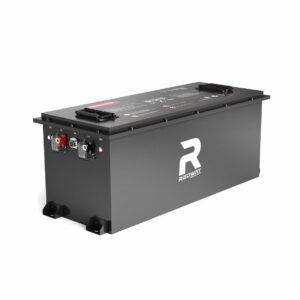What Are the Best Marine & RV Batteries Revolutionizing Off-Grid Power?
What defines the best marine and RV batteries for off-grid power? The top marine and RV batteries combine lithium-ion technology, deep-cycle efficiency, lightweight designs, and long lifespans to optimize energy storage for off-grid systems. Leading brands like Battle Born, Renogy, and Victron Energy prioritize fast charging, temperature resilience, and integration with solar setups, making them ideal for sustainable, reliable power in remote environments.
How Do Lithium-Ion Batteries Outperform Traditional Options?
Lithium-ion batteries dominate marine and RV applications due to their higher energy density, faster recharge rates, and longer cycle life (3,000–5,000 cycles) compared to AGM or lead-acid alternatives. They maintain stable voltage output even at low charge levels, resist vibration damage, and operate efficiently in extreme temperatures, reducing downtime and replacement costs.

For marine enthusiasts navigating cold climates, lithium-ion batteries maintain 95% capacity at -20°C, whereas lead-acid batteries lose 50% efficiency. In RVs, lithium’s rapid charging allows solar systems to replenish 80% capacity in 2 hours versus AGM’s 6-hour requirement. The table below highlights key performance differences:
| Feature | Lithium-Ion | AGM |
|---|---|---|
| Cycle Life | 3,000–5,000 | 400–600 |
| Weight (100Ah) | 30 lbs | 65 lbs |
| Charge Efficiency | 99% | 85% |
What Role Do Smart Battery Management Systems (BMS) Play?
A BMS protects batteries from overcharging, overheating, and short circuits while balancing cell voltages. Systems like Victron’s Smart BMS provide real-time diagnostics via mobile apps, offering insights into state of charge, health, and consumption trends. This proactive monitoring extends battery life by up to 30% and prevents catastrophic failures in harsh environments.
Advanced BMS units now incorporate predictive analytics, learning user habits to optimize charging schedules. For example, RV owners camping in cloudy regions benefit from BMS algorithms that prioritize solar charging during brief sunlight windows. The system also coordinates with inverters to reduce phantom loads, preserving energy for critical appliances. Key BMS functions include:
| Function | Benefit |
|---|---|
| Cell Balancing | Prevents voltage drift |
| Thermal Regulation | Maintains -4°F to 135°F operation |
| Load Management | Prioritizes essential devices |
Why Are Lightweight Designs Critical for Marine & RV Applications?
Reducing weight improves fuel efficiency and payload capacity in RVs and boats. Lithium-ion batteries weigh 50–70% less than lead-acid equivalents, enabling longer trips without compromising power reserves. For example, a 100Ah lithium battery weighs ~30 lbs versus 60–70 lbs for AGM, enhancing mobility and installation flexibility in compact spaces.
How Do Solar-Ready Batteries Enhance Off-Grid Systems?
Solar-ready batteries like Renogy’s Lithium Iron Phosphate models include built-in MPPT charge controllers and compatibility with 12V/24V systems. They streamline renewable energy storage, reduce wiring complexity, and maximize solar harvest efficiency. These batteries automatically adjust charging rates based on sunlight availability, ensuring continuous power without generator reliance.
Can Marine Batteries Withstand Harsh Environmental Conditions?
Premium marine batteries feature corrosion-resistant casings, waterproof ratings (IP67), and vibration-proof construction. For instance, Battle Born’s LiFePO4 batteries operate in -4°F to 135°F ranges and resist saltwater exposure, making them suitable for offshore use. Testing standards like UL 2743 ensure compliance with safety and durability benchmarks for marine applications.
“The shift toward lithium-ion technology in marine and RV sectors isn’t just about efficiency—it’s a sustainability leap. At Redway, we’ve seen lithium batteries cut energy waste by 40% compared to AGM, while their compatibility with renewables reduces carbon footprints. The next frontier is integrating AI to predict energy needs based on travel patterns, revolutionizing how adventurers harness off-grid power.”— Redway Power Systems Engineer
FAQs
- How long do lithium RV batteries last?
- Lithium batteries last 8–12 years, offering 3,000–5,000 cycles at 80% discharge, outperforming AGM’s 3–5-year lifespan.
- Can I replace lead-acid with lithium in my boat?
- Yes, but ensure your charging system supports lithium profiles and update wiring to handle higher current loads.
- Are lithium batteries safe in extreme heat?
- Modern LiFePO4 batteries include thermal sensors to prevent overheating, making them safe up to 135°F.
